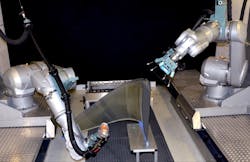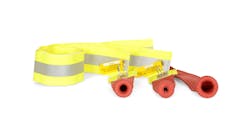FACC, one of the world’s leading aerospace companies specializing in the design, development and production of innovative aircraft components and systems, has been awarded a three-year research project in the field of robotics entitled “SPIRIT- A software framework for the efficient setup of industrial inspection robots”. The project under the lead of Profactor GmbH (Steyr) along with eight international scientific and industrial partners from Austria, Germany and Italy aims to develop a new generation of inspection robots, which will be used for a vast range of inspection tasks – without programming effort.
SPIRIT aims at developing the “universal inspection machine”
The software developed within the framework of SPIRIT aims at the development of inspection robots, which can deal with a wide range of challenges such as switching between different inspection technologies, inspecting new parts etc. All that the inspection robot will need is a CAD model of the component along with the CAD model of the work cell – to avoid collisions. Given this information, it will process the selected inspection technology and automatically generate an inspection program for the particular task at hand.
Reactive Planning
The robot will, furthermore, have the additional feature of being able to optimize the inspection process in real-time while it is running. For instance, in the case of unknown deformations, which are not accurately represented in the CAD model, slight mispositions of components or X-ray inspections where the sensor needs to be adjusted to the orientation of the honeycomb core in a composite part, the required optimization will be performed spontaneously.
Multiple benefits for FACC and other industry partners
Upon implementation, the project will offer multiple benefits such as
- Increased efficiency by replacing task programming with task configuration
- Providing a multi-faceted and more accurate description of possible deviations
- Optimized feedback to planning and design for possible adjustment of tolerances, which in turn will help to reduce unnecessary additional work.
About FACC
FACC is a worldwide leading aerospace company in design, development and production of innovative aircraft components and systems. Being the technology partner of all major manufacturers, FACC works together with its customers on developing solutions for the mobility of the future. Every second, there is an aircraft taking off with FACC technology on board. In full year 2017/18, FACC achieved more than 750 million Euro in revenues. FACC employs 3,400 people from 38 nations and working in 13 countries worldwide. The company is listed in the ATX of the Vienna Stock Exchange and part of the Fortune-500 Group AVIC, providing access to the largest growth markets within the industry. For more information please visit facc.com.



